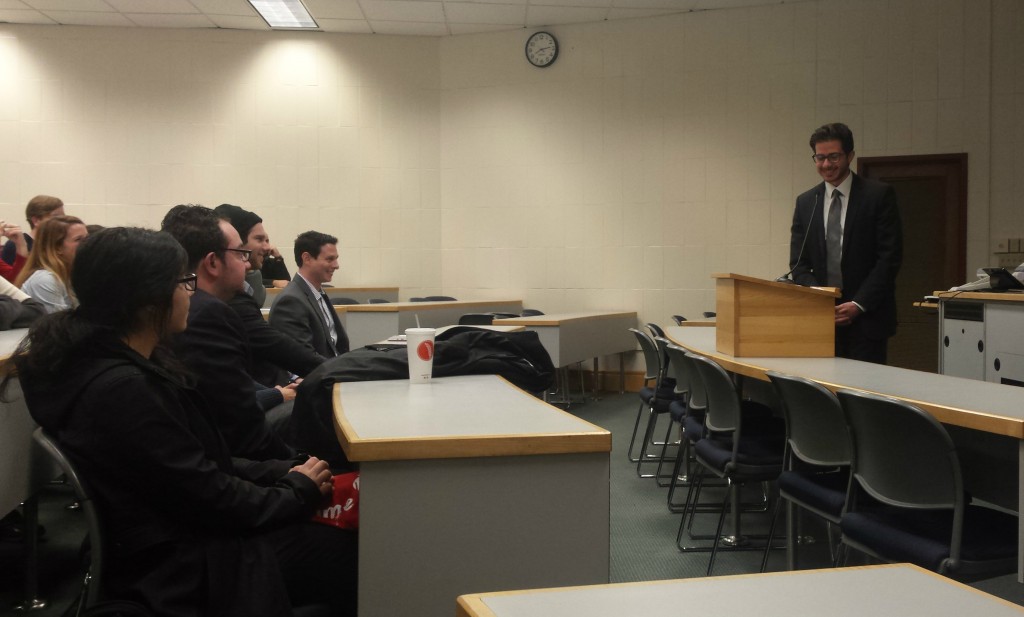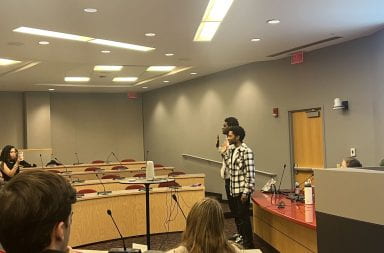
George Deek, an Arab-Israeli diplomat, speaks at Ohio State’s Moritz College of Law School on Feb. 10. Credit: Joely Friedman / For The Lantern
George Deek, a diplomat for Israel who identifies as Palestinian, Arab and Christian, as well as Israeli, spoke to students at Ohio State’s Moritz College of Law School Wednesday evening about creating a more peaceful era in Middle East.
Deek, who joined the Israeli Ministry of Foreign Affairs in 2008, expressed his concerns about the state of the Middle East today.
“Our region is going through a time of immense change, which creates insecurities that can easily be translated into hate,” he said. “Nothing less than our shared humanity is at stake. We should not be defining ourselves as victims and saying it’s hopeless, that there is no point. If we build a positive narrative we can build bridges between our different peoples and build a future together.”
Deek, whose family has lived in Jaffa, Israel for more than 400 years, said he hopes that Jews and Palestinians can recognize that while there has been suffering and harm in their histories together, it is time to move forward.
“Our next generation needs to feel that their aspirations are not deduced to a singular issue of being victims, of being hateful, of being resentful and being anti,” he said. “Instead, let’s be pro, pro peace, pro prosperity. The reason that I am standing here as an Israeli diplomat and not as a Palestinian refugee is because my family worked hard to build a life where I look around myself in Israel and I see only friends and partners to peace, not enemies.”
Mohamad Kamal Haykal, a first-year law school student who was involved with the OSU Muslim Student Association as an undergraduate student, asked Deek during the event about the rights of minorities in Israel.
“Why are Christians unable to carry out missionary practices freely in Israel? Why are certain citizens treated as second-class and Palestinians not able to purchase property in parts of the state where they may have long-standing roots?” Haykal said.
Deek’s response included clarifying some of the Israeli laws that Haykal’s question raised.
“Yes, Christians are not allowed to carry out missionary work in Israel, but it’s not just Christians; nobody is allowed to carry out missionary work in Israel because Israel does not want people to force their religion on others. It is against the law,” Deek said.
Addressing Haykal’s question about citizen rights in Israel, Deek, who is also an Israeli Lawyer and is currently a Fulbright Scholar in international law at Georgetown Law School, said that all citizens have equal rights under Israeli law.
“Palestinians like me, who live in Israel, can acquire land in the same way everyone citizen can. The Supreme Court of Israel ruled that Arab citizens are free to buy property anywhere in the state that they want and that there can be no Jewish-only neighborhoods,” he said.
Deek went on to provide examples of successes that other Arab-Israelis like himself have had, to further prove his point that all citizens in Israel, no matter how they identify, are equal.
“An Arab Christian in Israel today is a candidate for the Nobel Physics Prize for inventing a way to detect cancer from your breath,” he said. “An Arab Israeli is the vice president of Apple, and he had Apple open their major branch in Israel so that Arabs and Jews could work side by side together making these technologies.”
After the event, Haykal told The Lantern that he enjoyed Deek’s discussion and thought that many interesting points were made.
“Some tough questions were brought up, some tough issues,” he said. “I think that they were addressed from all sides, and I would like to see a mutuality between conflicting organizations so we can have civil discourse.”
Another student at the event, Brian Kurukulasuriya, a second-year in political science, said he believes that Deek provides an extraordinary outlook that is not seen enough in the U.S.
“It was refreshing to hear his perspective,” Kurukulasuriya said. “I like that George (Deek) showed that you can really love your land and love your people and still be able to provide constructive criticism in the hopes of making things better for the future.”


